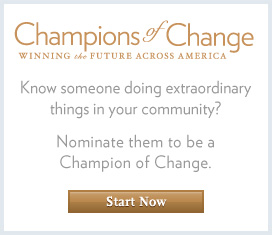Champions of Change Blog
Inspired by Change. Transformed Through Service.
Posted by on April 4, 2014 at 10:58 AM EDT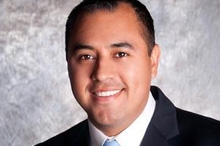
Germain Castellanos is being honored as a Cesar E. Chavez Champion of Change.
The work of Cesar Chavez has given me an example of an American who has dedicated his life to service. I feel that the spirit of service has been cultivated in me much like it was in Cesar Chavez. To serve is to seek the prosperity and well-being of your community before your own.
Growing up amidst gang-related violence and drugs, I had a front-row view of poverty in the U.S. As a youth hanging out with the wrong crowd, I found myself on the wrong side of the law, but at the age of 21 had cleaned up my act—I was a part-time college student with a full-time manufacturing job and had a 1-year-old daughter. I understood that, along with the bad choices that I had made as a youth, poverty was the common denominator in my case and those of other youth with my background across the U.S.
I wanted to start a program that could help connect at-risk youth with the resources that they need. I discovered the Youth Conservation Corps (YCC) and became a YCC AmeriCorps member. I worked as a Youth Developer during my time with YCC, conducting life skills workshops, providing case management services, and leading conservation projects. It was a time of great personal growth and transformation. My time as an AmeriCorps member at YCC resulted in me being granted the 2004 Corpsmember of the Year Award.
In June 2008, I set out to do what I had envisioned four years earlier: create my own program to assist at-risk youth. I designed the program curriculum, applied for and received grants, and established the SHINE Educational Leadership Program at Waukegan High School—the same school that I had been kicked out of when I was a teenager.
The SHINE Program is a workforce development program that helps low-income high school seniors transition into college and supports them in a career plan. Well over 90% of the students are first generation college-bound students. In addition to the in-school SHINE program, I have facilitated a partnership with Walgreens to provide pharmacy technician training and job placement for recent high school graduates. Every day I am proud to be connecting at-risk youth with resources. It is an honor to call this “my job”.
My transition from being a recipient of services to a provider of services for at-risk youth also earned me the Illinois Governor’s Journey Award in 2008. Running two youth workforce development programs and serving nearly 200 current and former program participants is just the tip of the iceberg; my work is not done. My community is over 30% foreign born and well over 55% of the households speak another language besides English at home. The community that I serve in is like many cities across the U.S.—it is an immigrant community. Whether their decedents came from Lithuania, Sweden, Germany, or Armenia generations ago or more recently from Mexico, Puerto Rico, Honduras, Colombia or Belize, the stories of my community members are all similar.
Immigrants come here for an opportunity to fulfill the promise of the American dream, to prosper and provide for their families in a way that was not possible in their home country. Knowing that my parents made sacrifices to get to the U.S. in search of a better life for their family motivates me to give back every day. In the words of Cesar Chavez, “We cannot seek achievement for ourselves and forget about progress and prosperity for our community.” We are all destined to serve.
Germain Castellanos is Program Director for the SHINE Educational Leadership Program, a Workforce Development program serving over 300 at-risk youth at Waukegan High School since 2008 where the student population is over 70% Latino.
Learn more aboutTo Serve and to Learn: What We Gain from Giving Back
Posted by on April 4, 2014 at 10:45 AM EDT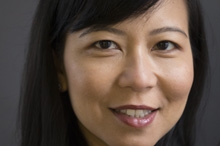
Khin Mai Aung is being honored as a Cesar E. Chavez Champion of Change.
I began my legal career in the San Francisco Bay Area during the “dot com boom” of the late 1990s, in the litigation department of a large law firm. It was a good firm and I worked on intellectually stimulating cases, but I wanted a more tangible connection to my work, and with my clients and community. I decided to take my career in a radically different path, and transitioned into a nonprofit public interest job that paid about 1/3 of my former salary.
At my new organization, I provided legal advice to indigent senior citizens at clinics throughout San Francisco. At first, the bulk of my cases involved welfare reform. Soon, rising rents led to a wave of eviction defense matters. It was rewarding to provide representation to individuals who wouldn’t otherwise have access to legal assistance, and learn from their diverse life experiences. I was in my 20s at the time, and many clients were old enough to be my grandparents. Some were immigrants and refugees from far flung places who left their homes to pursue opportunity or flee persecution. Others were native-born Americans who were relocated into internment camps as children during World War II. They all had interesting stories to tell.
Eleven years ago, I moved to New York City to launch the Asian American Legal Defense and Education Fund’s (AALDEF) Educational Equity Program. My work now encompasses a myriad of issues in kindergarten through 12th grade and higher education, representing and advocating for students, parents, and teachers in matters like obtaining programmatic access for English Language Learners, combatting anti-immigrant and anti-Asian harassment, and promoting school integration and diversity. My clients are different now – teenagers and adults – but I still learn from their experiences. I am grateful for the opportunity to partner with immigrant Chinese students to battle bias-based harassment, and with teachers who risk their jobs to report problems at their schools.
One of my most memorable cases involved representing a group of veteran teachers in Lowell, Massachusetts who were fired for failing a faulty mandatory English proficiency test. My clients, who hailed from Cambodia, Laos, and Puerto Rico, spoke fluent but accented English. The school district perceived them as deficient on account of their accents and national origin. Our work uncovered critical flaws in the fluency test and testing conditions, and my clients were ultimately reinstated with full back pay and benefits.
In the course of proving our case, I learned a lot about service and community from that group of teachers. Witness after witness came forward to testify that far from being deficient, my clients were assets to their schools. One was a volunteer sports coach, and another helped out with delinquent youth. All were exemplary role models for their students, most of whom came from working class immigrant and refugee families.
My life would never have intersected with any of these individuals had I remained in private practice. I am grateful for the opportunity to meet them, and honored to have served and learned from them.
Khin Mai Aung is the Director of the Educational Equity Program at the Asian American Legal Defense and Education Fund (AALDEF), where she advocates for the rights of Asian American and Pacific Islander students, parents and teachers. In particular, she focuses on concerns faced by immigrant students, English Language Learners, and students from lower income communities.
Learn more aboutWorking on the Frontlines of Humanity
Posted by on April 4, 2014 at 10:31 AM EDT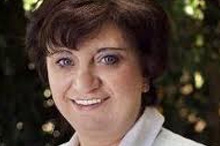
Nahla Kayali is being honored as a Cesar E. Chavez Champion of Change.
Dr. Martin Luther King Jr. said “You only need a heart full of grace. And you can be that servant.” My passion to serve humanity runs through my veins. To serve humanity is not dictated by the color of your skin, the credentials you hold, or the amount of money you make; it’s a blank passport. All you need is love, which is universal. I have dedicated my life to serving my community and working to ensure it has the resources to thrive. Thus, I am honored to be a White House Champion of Change.
It was during my divorce as I was trying to rebuild my life that my story of service begins. During my quest to enroll my daughter in health insurance, I learned about the Children’s Health Insurance Program (CHIP). Concerned for my child’s health, I right away enrolled my daughter in CHIP. I then asked myself—does my community know about CHIP?
I knew my community was underserved and didn’t have access to many resources so I made it my mission to start helping my community and that began with starting a non-profit agency. While my daughter enjoyed story-time at the library, I read piles of books on how to start a non-profit. As a single mom, immigrant, and with no education beyond the 8th grade, I came across challenges that discouraged me from pursuing my dream, but my guidance from Allah and love for humanitarian work reminded me that my destiny is to start an organization to serve my community.
Access California Services (AccessCal), a non-profit community-based culturally and linguistically competent family resource center, came to life in 1998. I received a $2,000 grant from Community Action Partnership of Orange County and worked out of a one-room office using a folding table and telephone I brought from home. I was the organization’s first volunteer. My first task was to outreach and enroll underserved children in CHIP.
Through this program, I learned that the community needed much more than health coverage. I collaborated with the community to implement a needs assessment that surveyed 200 families. Through the assessment, I determined what other services were needed, and with that, our organization grew. Today AccessCal provides 12 programs including health access, mental health, employment services, immigration and citizenship services.
It’s been 15 years since AccessCal was established. AccessCal is my second home. When I walk down the hallways of the organization and see our refugee and immigrant clients crying tears of joy—it becomes my joy. When Khalid got his first job as a lab technician to help him put food on the table for his kids, when Fatima pledged allegiance to the flag and became a registered voter, when Sarah got health coverage to address her cancer diagnosis, when Nasser learned how to speak English to speak to his grandkids, when Mariam and Saeed saved their marriage after receiving counseling, and when Faisal learned to type a resume after taking our computer classes, I was reminded we have the capacity to change lives.
It’s an honor to have AccessCal recognized at the government level. Through grants at the federal, state, county, city, and foundation level and with the in-kind support of volunteers, community members, advocacy organizations, and business owners we are able to continue the work we are doing—which is serving humanity.
Nahla Kayali is the Founder and Executive Director for Access California Services, a non-profit community-based family resource center dedicated to providing Arab-Americans and Muslim-Americans in Southern California with culturally and linguistically competent health and human services.
Learn more aboutThe "Public Good" Is Not a Dirty Word: Rebuilding Our Collective Responsibility
Posted by on April 4, 2014 at 10:17 AM EDT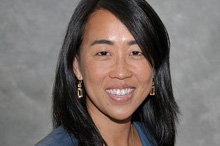
Helen Gym is being honored as a Cesar E. Chavez Champion of Change.
I was raised in Columbus, Ohio, the daughter of immigrants. Like most immigrant families, my parents did not have that much. As a child, my life revolved around the public institutions in my neighborhood—the parks, the libraries, the local recreation center, and of course my public school. These public spaces opened up the world around me to new opportunities, a diversity of people and ideas, and a chance to really engage and participate.
My parents and I relied on these public resources to give me the kind of education that our family couldn’t provide on its own. These public spaces were great equalizers, places where people from all backgrounds came together and understood—in a personal way—what it means when a society provides opportunities to its citizens.
I think a lot about the fragility of our public spaces today.
There is no question that our collective spaces are becoming increasingly diminished. In Philadelphia, our drastically underfunded public school system—where my three children attend—is in virtual freefall from spiraling political and financial disinvestment. Our school district has closed dozens of public schools and stripped essential services from each and every school community.
Meanwhile, we see hyper individualized notions of choice replacing what was once a fundamental, collective responsibility to provide an equitable and quality public education to all our children. To me, public education and the responsible and loving care of our children is the central issue of Philadelphia’s future. In a city where 39 percent of children live in poverty, it is essential that we institutionalize quality public schools in every neighborhood for every child.
That is why so much of my work is rooted in rebuilding our sense of public good and shared collective responsibility. At Asian Americans United, a 28-year-old community organization in Philadelphia Chinatown, we have created vibrant investment in public spaces through the establishment of a Chinatown arts festival that takes over the streets of a hard fought-for neighborhood; we have founded a school celebrating folk arts and serving many immigrant families that lies on the footprint of a historic struggle over community vision. And we’ve worked with young people to create a new generation of leaders who will care for our communities and preserve the public trust.
I co-founded Parents United for Public Education with fellow, like-minded parents to address poverty, inequity and disinvestment in long-neglected school communities. We are building conscious anti-racist leadership so that the hurts inflicted on our communities do not perpetuate racial divisions. We need strong parent voices to challenge perceptions of disengaged parents or “broken” families and school communities. Our parents have testified on budgets and tax policy, we’ve challenged abusive disciplinary practices, and called for collaborative partnerships with teachers and parents. In a city segregated by class and race, we’re working to build multiracial coalitions of parents to improve school practices, fight for new funding, and build public support for nurturing, stable rich learning environments for our children.
I’ve learned that our public spaces, our communities and our schools are not just places that exist in stasis. We have to learn to fight to preserve these spaces, to uplift them and to pass down the lessons of preservation and community to our children and our fellow neighbors. I see this work as a constant process of engagement, of seeking knowledge and solutions that not only alter unjust situations but transform our relationships with one another and open up possibilities for a new future.
Helen Gym is a community and educational leader in Philadelphia, where she serves on the board of Asian Americans United. She is co-founder of Parents United for Public Education, a citywide group of parents working for equity and justice in Philadelphia’s public schools.
Learn more aboutOpening Doors to Opportunities for a Better Future
Posted by on April 4, 2014 at 10:01 AM EDT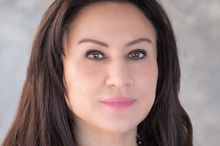
Sandra Gutierrez is being honored as a Cesar E. Chavez Champion of Change.
Parents are among our country's unsung heroes. They shoulder the most important responsibility of all—raising our beloved country’s future generations. The parenting journey is rewarding, often challenging, and lasts a lifetime.
I’m grateful to be considered a White House Champion of Change and remain ever inspired by the hard-working families I have been privileged to learn from and work with for over 40 years.
Parents—regardless of their level of education, first language, immigration or economic status—have similar aspirations for their children. I often hear parents say, “I came here to work, to work hard, so that my children will have more opportunities than I had. I work so they will have a better life and a better future.” As leaders of their families, parents make decisions of great consequence, especially for young children. The good news is that small, positive daily acts—talking, counting, reading, singing—can have a big impact on children’s success.
The Abriendo Puertas / Opening Doors program acknowledges and honors that deeply held aspiration of many parents for a better future for their children. Abriendo Puertas is a two generation model designed to support this vision by working with Latino families to ensure that parents of children aged 0 to 5 are informed and engaged as their child's first and most influential teacher.
We frequently hear about the “achievement gap” between Latino and non-Latino children. I believe “opportunity gap” is a more honest term, because it identifies the root of the gap as systemic and circumstantial, rather than a failure on the part of the child. At Abriendo Puertas, we expand opportunities for families by taking the best research off the shelf and making it accessible and actionable for Latino parents throughout United States.
The Abriendo Puertas curriculum, infused with parent input, uses popular education methodologies. We demystify school readiness and promote parent leadership and advocacy. We provide key local data and outside resources such as Let's Move!, MyPlate, U.S. Dept. of Education Early Learning, and the Affordable Care Act. Armed with greater confidence and data about the education, economic and health status in their own neighborhoods, parents become vocal advocates for improving underperforming schools, increasing social and economic resources, and promoting healthier lifestyles.
In our efforts to ensure best practices and to contribute to the field, Abriendo Puertas recently participated in a rigorous independent evaluation by Child Trends. The study found that our program has a number of important areas of impact, especially related to education. These findings will allow us to continue to improve our services and focus our efforts in areas where we can have the most impact.
Cesar Chavez once said, “Once social change begins, it cannot be reversed. You cannot uneducate the person who has learned to read. You cannot humiliate the person who feels pride. You cannot oppress the people who are not afraid anymore. We have seen the future, and the future is ours.”
His clear belief in the heroism of farmworkers and the power of advocacy and collective action inspires us to work hard so that parents’ hopes and dreams for their children are converted into clear goals and informed plans. Important challenges—need for immigration reform, improving education quality—demand attention and are key to unlocking the incredible potential in our rising diversity. With the current historic focus on early education, reading, family engagement, and on boys of color, the climate is conducive for parent leadership and advocacy to help eliminate the opportunity gap and create a better future for children.
Sandra Gutierrez is the National Director of the Abriendo Puertas/Opening Doors Program. Abriendo Puertas/Opening Doors is the nation’s first comprehensive and evidence based training program developed by and for Latino parents with children ages 0 to 5.
Learn more aboutReimagining Education in the 21st Century- Aloha ‘Āina (Love the Land)
Posted by on April 4, 2014 at 9:45 AM EDT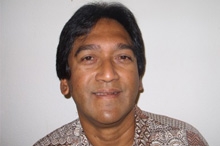
Herb Lee, Jr. is being honored as a Cesar E. Chavez Champion of Change.
Twenty years ago, I took on the responsibility to preserve and restore a 400-year-old ancient Hawaiian fishpond called Waikalua Loko. As a child, I grew up in the area and never knew the pond existed. I did not know a lot about fishponds, but I was overcome by a feeling to mālama or care for this place.
I recalled my Hawaiian grandmother who had passed away some 30 years prior about the lessons and depth of Aloha that she lived and tried to teach us. I remembered the sacrifices my parents made to send us to good schools so that we could have a better education than they did.
As Hawaii changed and became a state, so did we. As I got older, I felt a deeper calling to understand the ways of old, the connection to place, to people, the culture and the richness that was uniquely Hawaii.
The restoration of the pond became both a physical and spiritual journey of understanding and awakening that I only began to comprehend. Many others were equally drawn to this place for reasons unknown but have been gratefully accepted. They have become mentors, teachers, stewards and most of all family.
One day, a teacher from a local high school asked to bring her class to the pond as an extended “community classroom.” In an effort to make her science lessons more relevant, she was hopeful that a more “hands on” experience would do the trick. The transformation we witnessed inspired us to pursue innovative opportunities to reach more students in the community.
In 2000, the Waikalua Loko Fishpond Preservation Society partnered with the Pacific American Foundation (PAF), a non-profit 501(c)(3) organization to embark on a journey that would evolve into the Aloha ‘Āina framework built on relationships, relevance and rigor.
By 2005 through 2011, PAF received numerous awards and recognition by the Native Hawaiian Educational Council, the Hawaii Department of Education and the Hawaii Historic Foundation for its work in developing a “new model” for culture-based education, preservation and stewardship of the environment in Hawaii. Since then PAF has had numerous opportunities to expand its curriculum development to Hawaii’s coral reef systems, other ahupua’a throughout the state, the Island of Kahoolawe, the science of tsunamis, and sea level rise.
Why education? In the 21st century, one’s level of educational attainment is directly proportional to good health, career advancement, employability, and stewardship of both individual and collective resources (community) in the places we choose to live. Further, Hawaii’s unique and isolated geographic conditions have provided the native and indigenous Hawaiian people of the islands with a rich cultural and sustainable method of living that is unmatched throughout the world. Thus the merging of traditional knowledge that is still practiced today with 21st century skills has catalyzed a new and rediscovered formula for how we teach children in the modern age.
To date PAF has developed (1) over 200 partners throughout Hawaii, the Pacific and the U.S. continent to support its success and mission; (2) enrolled over 21,000 students in its career planning system; (3) trained over 3,500 teachers statewide; (4) have over 70,000 students, parents, teachers and community members learn and steward the fishpond; and (5) provided fiscal sponsorship services for 12 community organizations.
As we approach each new school year, we hope to continue to learn from each other to give teachers, students, families and communities the tools and resources they need to be successful.
Herb Lee, Jr. is the Executive Director of the Pacific American Foundation located in Kāne’ohe, Hawaii, a non-profit dedicated to improving the lives of Pacific Americans.
Learn more about Veterans
- &lsaquo previous
- …
- 25
- 26
- 27
- 28
- 29
- 30
- 31
- 32
- 33
- …
- next &rsaquo

